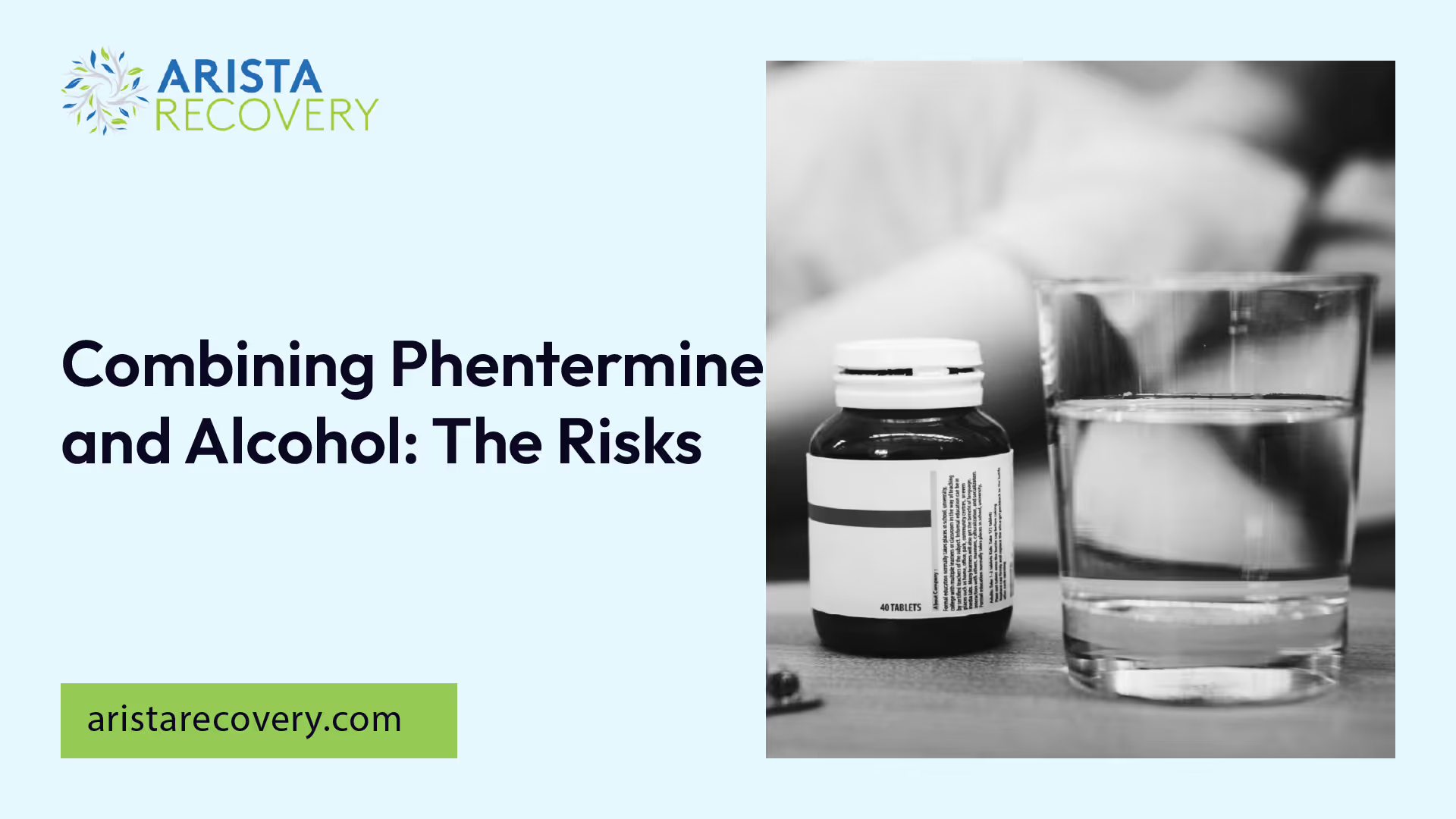
Combining Phentermine and Alcohol: The Risks
Understanding Phentermine
As we delve into the topic of phentermine and alcohol, it is essential to first understand the basics of phentermine, its use, and potential side effects.
Overview of Phentermine Use
Phentermine is a prescription medication that is commonly used for weight loss. It works by serving as an appetite suppressant, stimulating the release of specific chemicals in the brain that help control appetite. It is a part of a class of drugs referred to as sympathomimetic amines and is typically used alongside a doctor-approved exercise, behavior change, and a reduced-calorie diet program to aid individuals in losing weight.

An essential note is that phentermine is intended for short-term use and should be a component of a comprehensive weight loss plan that includes a balanced diet and regular exercise. Prolonged use of phentermine is generally not recommended due to the potential for dependence and the risk of side effects.
The Food and Drug Administration (FDA) approves phentermine for those with a body mass index (BMI) over 30 kg/m^2 or a BMI over 27 kg/m^2, along with a health condition such as high blood pressure or diabetes.
Potential Side Effects of Phentermine
While phentermine is considered safe on its own, it can have side effects. The most common side effects reported with phentermine use are dry mouth and trouble sleeping.
However, it is effective in weight loss. Studies show that about 80% of people with obesity lost at least 5% of their body weight after six months of phentermine treatment.
It's important to note that while phentermine is an effective weight loss tool, its interaction with other substances such as alcohol can lead to adverse effects. Therefore, understanding the potential risks and precautions when combining phentermine and alcohol is crucial for safe consumption.
Impact of Alcohol on Phentermine
Understanding the influence of alcohol on phentermine is crucial for anyone using this drug. The interaction between the two substances can lead to a range of adverse effects, from increased likelihood of side effects to serious health risks.
Conflicting Effects on the Body
Mixing phentermine and alcohol can have conflicting effects on the body. Phentermine stimulates the central nervous system, while alcohol depresses it. This contrasting impact can lead to unpredictable reactions and potentially dangerous situations.
Moreover, the combination of alcohol and phentermine can exacerbate already-present side effects, causing issues related to the gastrointestinal, cardiovascular, and central nervous systems.
Phentermine is known to increase heart rate and blood pressure, which can be further intensified by the consumption of alcohol. This additional strain on the cardiovascular system can potentially lead to serious complications.
Risks of Mixing Phentermine and Alcohol
The risks of mixing phentermine and alcohol are numerous. Beyond the conflicting effects on the body, combining these two substances can increase the risk of various adverse effects. This includes an increased likelihood of experiencing side effects such as dizziness, drowsiness, and impaired coordination [1].
Additionally, the combination of phentermine and alcohol can heighten the risk of blackouts. Alcohol can impair memory and cognitive function, and when mixed with phentermine, the risk of memory loss and impaired recall can be significantly increased.
In conclusion, the combination of phentermine and alcohol can lead to serious health risks. It is important for anyone taking phentermine to understand these risks and to avoid combining this medication with alcohol. Always consult with a healthcare professional if you have questions about drug interactions and potential health risks.
Adverse Effects of Phentermine-Alcohol Combination
When discussing the combination of phentermine and alcohol, it's essential to understand the potential adverse effects. The mix can lead to an increased likelihood of side effects and a risk of blackouts.
Increased Likelihood of Side Effects
Phentermine, an appetite suppressant commonly prescribed as Adipex-P, is popular for weight-related issues. However, combining phentermine with alcohol can increase the risk of various side effects. These include dizziness, drowsiness, and impaired coordination, which can be further intensified when alcohol is consumed alongside phentermine [1].
Moreover, the combination can lead to gastrointestinal, cardiovascular, and central nervous system problems, exacerbating already-present side effects.
Risk of Blackouts
Another risk to consider when mixing phentermine and alcohol is the increased likelihood of blackouts. Alcohol can impair memory and cognitive function. When combined with phentermine, the risk of memory loss and impaired recall can be heightened.
In addition, the combination of phentermine and alcohol can increase the risk of overdose due to their contrasting effects on the body - phentermine being a stimulant and alcohol being a depressant.
These risks underscore the importance of understanding the potential dangers of combining phentermine and alcohol. It's always recommended to consult with a healthcare provider before mixing any prescription medications with alcohol. This can help to ensure a safe and effective treatment process and reduce the risk of adverse reactions.
Cardiovascular Risks
The combination of phentermine and alcohol can have severe repercussions on the cardiovascular system, leading to increased risks and potential complications.
Strain on the Cardiovascular System
Phentermine, a weight loss medication, is known to increase heart rate and blood pressure. When combined with alcohol, which can have similar effects, it can put an additional strain on the cardiovascular system. This added strain can lead to serious complications, especially for individuals with pre-existing cardiovascular conditions.
Furthermore, the concurrent use of phentermine and alcohol can increase the risk of severe side effects such as high blood pressure, chest pains, heart attack, or stroke. This risk is particularly significant for individuals with obesity who are already at risk for cardiovascular diseases.
Exacerbation of Cardiovascular Side Effects
The simultaneous ingestion of phentermine and alcohol can exacerbate cardiovascular side effects. Phentermine is known to increase heart rate and blood pressure, and alcohol can have similar effects. Mixing the two substances can lead to a significant rise in these effects, potentially leading to serious complications.
Moreover, the combination of phentermine and alcohol can significantly increase the risk of cardiovascular side effects such as high blood pressure, chest pains, heart attack, or stroke, especially in individuals with existing heart disease or obesity.
Understanding these cardiovascular risks associated with mixing phentermine and alcohol is imperative for anyone considering this combination. It's clear that the potential dangers far outweigh any perceived benefits, making it a combination to be avoided.
Guidelines for Safe Consumption
Navigating the world of pharmaceuticals can be challenging, especially when it comes to interactions between different substances. In the case of phentermine and alcohol, safe consumption is paramount to avoid potential health risks.
Waiting Period Between Consumption
One crucial guideline to follow is the waiting period between alcohol consumption and taking phentermine. It is recommended to wait at least 12 hours between consuming alcohol and taking phentermine to prevent severe reactions. This waiting period is necessary due to the contrasting effects of these substances on the body - phentermine being a stimulant and alcohol being a depressant. The simultaneous use of these substances can potentially lead to an overdose, as they can mask the symptoms of each other [5].
Recommendations for Combining Phentermine and Alcohol
In terms of combining phentermine and alcohol, it is generally advised to avoid such a mix. The combination can cause gastrointestinal, cardiovascular, and central nervous system problems, which can be dangerous [4]. Furthermore, the combination can significantly weaken the weight loss abilities of phentermine, potentially nullifying the benefits of the medication.
Moreover, combining phentermine with alcohol can increase the risk of developing severe side effects, including alcohol use disorder. It also increases the risk of cardiovascular side effects such as high blood pressure, chest pains, heart attack, or stroke. This risk is especially high in individuals with existing heart disease or obesity [5].
In summary, while it might be tempting to combine phentermine and alcohol, it is crucial to understand the potential risks. It is generally advised not to mix these substances, and if you choose to do so, it is important to wait an adequate amount of time between consumption. Always remember that your health is paramount, and taking precautions can significantly reduce the risk of potential harm.
Weight Loss and Substance Interaction
The interplay between substances like phentermine and alcohol can have significant implications on weight loss and related health conditions. Understanding these effects can help individuals make informed decisions about their health and wellbeing.
Effects on Weight Loss Abilities
Phentermine is an effective oral weight loss medication approved by the FDA for individuals with a body mass index (BMI) over 30 kg/m2 or a BMI over 27 kg/m2 along with a health condition like high blood pressure or diabetes [3]. It works by activating the sympathetic ("fight or flight") nervous system, reducing appetite and creating an energy deficit to facilitate weight loss.
Research indicates that about 80% of people with obesity lost at least 5% of their body weight after six months of phentermine use [3]. However, combining phentermine with alcohol may compromise its weight loss abilities. Alcohol, being rich in empty calories, could counteract the appetite-suppressing effects of phentermine and lead to weight gain instead.
Impact on Weight-Related Conditions
Phentermine is often prescribed to individuals with obesity-related conditions because it stimulates the release of neurochemicals like dopamine and adrenaline, which suppress appetite and lead to weight loss over time.
While phentermine assists in weight loss, it should be noted that it is a controlled substance with a risk of misuse or dependence. The most common side effects are dry mouth, trouble sleeping, and headaches.
When alcohol, a substance known for its detrimental health effects, is combined with phentermine, it can exacerbate these side effects. Moreover, it can hinder the management of obesity-related conditions by negating the benefits of weight loss achieved through phentermine.
Alcohol is known to contribute to weight gain, liver disease, and other health problems. When used alongside a weight loss medication like phentermine, it can lead to increased health risks. Thus, individuals using phentermine should be cautious about combining it with alcohol, due to the potential negative impacts on weight-related conditions and overall health.
Understanding the interaction between phentermine and alcohol is crucial for anyone considering this weight loss medication. While phentermine can be effective in promoting weight loss, its combination with alcohol can pose potential risks. Therefore, it's recommended to discuss these factors with healthcare professionals before starting any weight loss regimen involving phentermine.
References
[1]: https://www.townsendla.com/blog/phentermine-and-alcohol
[2]: https://www.webmd.com/drugs/2/drug-4151/phentermine-oral/details
[3]: https://www.goodrx.com/phentermine/weight-loss
[4]: https://northjerseyrecovery.com/phentermine-and-alcohol-a-dangerous-combo/
[5]: https://guardianrecovery.com/addiction-treatment/alcohol-abuse-addiction/dangers-of-mixing-alcohol-and-phentermine/
When mental health challenges and addiction intersect, it can feel isolating. At Arista, we offer compassionate, evidence-based, and trauma-informed care to help you heal, grow, and move forward.
You’re not alone in this.
When mental health challenges and addiction intersect, it can feel isolating. At Arista, we offer compassionate, evidence-based, and trauma-informed care to help you heal, grow, and move forward.
Support that moves with you.
You’ve taken a brave first step. At Arista Recovery, we’re here to help you continue with best-in-class care designed for long-term healing and support.
.webp)






